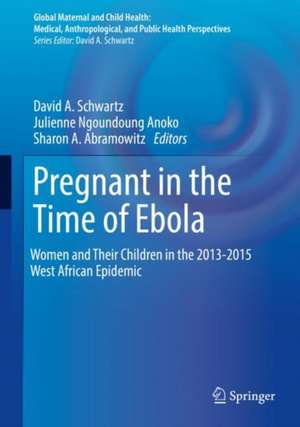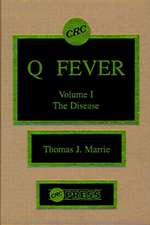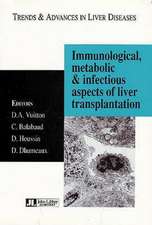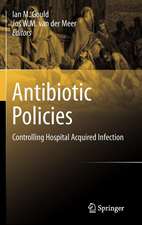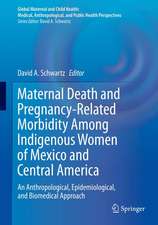Pregnant in the Time of Ebola: Women and Their Children in the 2013-2015 West African Epidemic: Global Maternal and Child Health
Editat de David A. Schwartz, Julienne Ngoundoung Anoko, Sharon A. Abramowitzen Limba Engleză Hardback – 15 ian 2019
A sampling of the topics:
- Ebola virus disease: perinatal transmission and epidemiology
- Comprehensive clinical care for children with Ebola virus disease
- Maternal and reproductive rights: Ebola and the law in Liberia
- Ebola-related complications for maternal, newborn, and child health service delivery and utilization in Guinea
- The Ebola epidemic halted female genital cutting in Sierra Leone—temporarily
- Maternity care for Ebola at Médecins Sans Frontières centers
- Stigmatization of pregnant women with and without Ebola
- Exclusion of women and infants from Ebola treatment trials
- Role of midwives during the Ebola epidemic
Preț: 1059.33 lei
Preț vechi: 1115.09 lei
-5% Nou
Puncte Express: 1589
Preț estimativ în valută:
202.70€ • 220.87$ • 170.81£
202.70€ • 220.87$ • 170.81£
Carte tipărită la comandă
Livrare economică 23 aprilie-07 mai
Preluare comenzi: 021 569.72.76
Specificații
ISBN-13: 9783319976365
ISBN-10: 3319976362
Pagini: 518
Ilustrații: XXXIV, 487 p. 128 illus., 123 illus. in color.
Dimensiuni: 178 x 254 x 36 mm
Greutate: 1.12 kg
Ediția:1st ed. 2019
Editura: Springer International Publishing
Colecția Springer
Seria Global Maternal and Child Health
Locul publicării:Cham, Switzerland
ISBN-10: 3319976362
Pagini: 518
Ilustrații: XXXIV, 487 p. 128 illus., 123 illus. in color.
Dimensiuni: 178 x 254 x 36 mm
Greutate: 1.12 kg
Ediția:1st ed. 2019
Editura: Springer International Publishing
Colecția Springer
Seria Global Maternal and Child Health
Locul publicării:Cham, Switzerland
Cuprins
Ebola's Assault on Women, Children, and Family Reproduction: An Introduction to the Issues.- The West African Ebola Epidemic: Overview and Timeline.- Finding Flexibility Within Tradition in Guinea: Diffusing Community Crisis Through Ebola-focused Ethnography.- Effects of the Ebola Epidemic on Health Care of Pregnant Women: Stigmatization With and Without Infection.- Ebola's Unintended Consequences: The Challenges of Managing Pregnant Ebola-suspected Women in Ebola Contexts.- Clinical Care for Pregnant Women in an Ebola Treatment Center.- The Care of Children and Orphans Affected by Ebola During the Response to the Disease in Guinea.- Taking 'Life Off Hold' During a Time of Crisis in Freetown, Sierra Leone.- Public Health Aspects of the Ebola Epidemic in Women and children.- Between Safety, Fear, and Obligation of Care: Being Pregnant in Guinean Ebola Treatment Unit.- Risk Without Recognition: The Experiences of Traditional Midwives and Birth Attendants Who Filled the Gap in the Time of Ebola.- Ebola and Pregnancy in Guinea.- The 2013-2015 Ebola Outbreak and Child Development: Measuring the Impact Among Child Survivors and Peers, and Identifying Opportunities for Care.- Perspectives From Ebola Survivors in Liberia.- Retrospective Community Perceptions of Being Pregnant During the Ebola Outbreak in Urban Liberia.- Comprehensive Clinical Care for Children With Ebola.- Providing Care for Women and Children During the Ebola Epidemic: A Volunteer Physician's Experiences.- Who Delivers? Birthing Roles in Sierra Leone.- Gender-based Violence and Teenage Pregnancy: Neglected Consequences of the 2013 Ebola Outbreak.- Health Workers, Children, and Families: Communication Challenges in the Ebola Context.- Medical Care of Women and Pregnancy in Conakry at the Ignace Deen Hospital During the Ebola Epidemic.- Understanding Sexual Behavior and Fertility Changes in Female Survivors of Ebola.
Recenzii
“It is an important, worthy project, and the volume is the most comprehensive work on “lessons learned” from the West Africa epidemic. It will be an invaluable resource for policy makers and practitioners faced with future health emergencies of international concern.” (Catherine Bolten, African Studies Review, Vol. 63 (3), 2020)
“This is a comprehensive and detailed source book for anyone in the medical, public health, anthropology, and political fields who wish to learn about and from the Ebola epidemic of 2013‐15. … It is a rich resource from which to build in order to prevent, provide rapid intervention, and ameliorate the consequences of future Ebola outbreaks.” (Joan Ann MacEachen, Doody's Book Reviews, November 8, 2019)
Notă biografică
David A. Schwartz, MD, MS Hyg, FCAP, has an educational background in Anthropology, Medicine, Public Health, Emerging Infections, Women's Health and Epidemiology. He sub-specializes in Obstetrical, Fetal, and Perinatal Pathology as well as Emerging Infections, and has a professional interest in reproductive health, and maternal and infant disease and death in both resource-rich and resource-poor countries. Dr. Schwartz has organized and directed large national and international investigations of health of women and children, obstetrical disease, perinatal pathology, and epidemiology for many government agencies including the CDC, NIH, and USAID, and has consulted and taught in these specialties in resource-poor nations. He has been a recipient of many grants, and was a Pediatric AIDS Foundation Scholar. He edited a newly-published book regarding anthropological and public health aspects of maternal morbidity and mortality in developing nations that was published in October, 2015(Maternal Mortality: Risk Factors, Anthropological Perspectives, Prevalence in Developing Countries and Preventive Strategies for Pregnancy-Related Deaths), and was previously a co-editor of an award-winning 2-volume medical textbook on infectious diseases with Appleton-Lange Publishers (Pathology of Infectious Diseases. Volumes I and II). He is the editor of a 36-chapter text currently in progress for Springer, Maternal Health, Pregnancy-Related Morbidity and Death Among Indigenous Women of Mexico & Central America: An Anthropological, Epidemiological and Biomedical Approach. He has authored more than 120 peer-reviewed articles as well as 47 chapters in his specialty areas in the medical literature. Dr. Schwartz is an experienced editor, currently serving on the Editorial Boards of three major international journals, and is associate editor for one of them. He has previously taught at several universities, and is currently a clinical professor at the Medical College of Georgia. Dr. Schwartz has long experience at understanding and integrating the anthropological, biomedical, epidemiological, and public health aspects of emerging infectious diseases as they affect society, especially women and children. Both Drs. Schwartz and Abramowitz have recently been active in addressing aspects of the current global Zika virus situation.
Julienne N. Anoko, PhD, MS, is a social anthropologist (PhD) from the Sorbonne University in Paris, France. She completed her academic preparation (MS) in the areas of epidemiology and public health, and gender and health. For more than 15 years, she has been supporting several institutions (public administrations, NGOs, international development, and United Nations organizations) in addressing social norms and gender issues both during emergency outbreaks and into development programs for better efficiency and accountability. Between 2005 and 2014, Dr. Anoko supported the World Health Organization and UNICEF during the Ebola and Marburg outbreaks, as well as the H1N1 influenza pandemic in both developed and developing countries in Africa, America, and Europe. In 2015, she joined the United Nations Mission for Ebola Emergency Response (UNMEER) in Guinea to coordinate, support, and leverage the Social Mobilization and Community Engagement pillar in order to implement interventions compatible with local contexts to gain community trust and participation into the overall response. Between 2015 and 2016, she was appointed as in-house social anthropologist of UNICEF in the Guinea-country Office to support the mainstreaming of social norms into both the Ebola emergency response and development programs. Dr. Anoko has published books and papers and contributed in developing several guidelines for United Nations agencies dealing with her areas of expertise. She had been featured in articles from NPR, National Geographic, The Washington Post, WHO, and others. She is recipient of the "Research and Innovation 2015 Award" for her engagement in the field during the West African Ebola epidemic from the French Red Cross Humanitarian Fund.
Sharon Abramowitz, PhD, is an independent consultant and former assistant professor of Anthropology and African Studies at the University of Florida in Gainsville. She is currently pending as a research affiliate with Rutgers, The State University of New Jersey. As a medical anthropologist, Dr. Abramowitz has conducted research on community-based response to epidemics and pandemic events, Ebola, humanitarian intervention, mental health, gender-based violence, health sector transitions, and post-conflict reconstruction in West Africa since 2000. She is the author of Searching for Normal in the Wake of the Liberian War (University of Pennsylvania Press 2014), co-editor of Medical Humanitarianism: Ethnographies of Practice (University of Pennsylvania Press 2015), and has authored many peer-reviewed articles in leading scientific journals. Presently, Dr. Abramowitz plays a leading role in social science's response to the West African Ebola epidemic, and is the principal investigator for the Ebola 100 Project, which is establishing a "history of the present" of humanitarian experiences during the Ebola outbreak. She also is conducting research on community-based responses to epidemic and pandemic events.
Textul de pe ultima copertă
This comprehensive account of the deadliest Ebola outbreak in history examines its devastating effects on West Africa’s most vulnerable populations: pregnant women and children. Noted experts across disciplines assess health care systems’ responses to the epidemic in Liberia, Guinea, and Sierra Leone, emphasizing key areas such as pregnancy, prenatal services, childbirth, neonatal care, and survivor health among pregnant and non-pregnant women. The 30 chapters hone in on gender-based social issues exacerbated during the outbreak, from violence against women and girls to barriers to female education. At the same time, chapters pinpoint numerous areas for service delivery and policy improvements for more coordinated, effective, and humane actions during future pandemics.
A sampling of the topics:
A sampling of the topics:
- Ebola virus disease: perinatal transmission and epidemiology
- Comprehensive clinical care for children with Ebola virus disease
- Maternal and reproductive rights: Ebola and the law in Liberia
- Ebola-related complications for maternal, newborn, and child health service delivery and utilization in Guinea
- The Ebola epidemic halted female genital cutting in Sierra Leone—temporarily
- Maternity care for Ebola at Médecins Sans Frontières centers
- Stigmatization of pregnant women with and without Ebola
- Exclusion of women and infants from Ebola treatment trials
- Role of midwives during the Ebola epidemic
Caracteristici
Is the first book (and potentially only book) to discuss the effects of the 2013-2015 West African Ebola epidemic on women, pregnancy, infants, and children Is the authoritative book in this field, due to the wide range of expertise of the authors, together with the central role that they and their institutions played during the Ebola epidemic Is unique in using a combined multi-specialty approach to the problems and potential solutions of the Ebola virus outbreak in West Africa, incorporating the opinions of internationally known experts in clinical medicine, anthropology and the social sciences, public health, epidemiology, midwifery, nursing, and other fields Includes experts from Europe and the United States, as well as local West African experts who were directly involved in the outbreak Includes the viewpoints and experiences of authors from multiple international agencie Is comprehensive, with 30 chapters that include numerous illustrative photographs, figures, maps, and diagrams all dealing with issues regarding women (both pregnant and non-pregnant), infants, and children in Guinea, Sierra Leone, and Liberia during the Ebola epidemic s who were deployed to the outbreak, including UNICEF, Partners in Health, Médecins Sans Frontières (Doctors Without Borders), International Rescue Committee, the U.S. Centers for Disease Control and Prevention (CDC), National Health Service of Great Britain, UNFPA, The Carter Center, and others Addresses issues of importance to the care of women and their children during a multinational epidemic of a life-threatening infectious disease. These include biomedical complications of pregnancy, access to obstetrical care, maternal and infant clinical outcomes, effects of the epidemic on healthcare for non-pregnant women, birthing roles, roles of anthropologists and social scientists, gender-based violence and obstetrical violence, stigmatization, training and use of midwives and traditional birth attendants, teenage pregnancy, survivorship issues, deployment of international workers and the emergency response, Ebola treatment centers, and others
